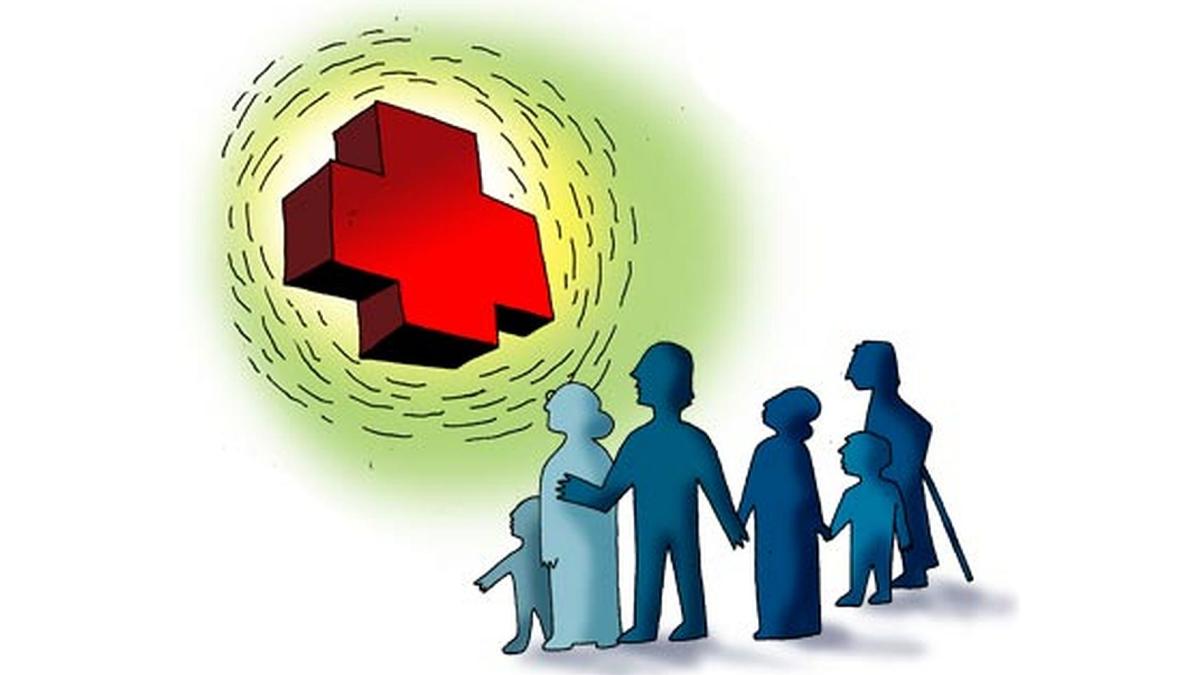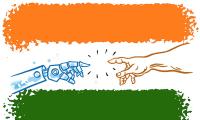AI in Healthcare to Boost India's GDP by $30 Billion by 2025
A new report by Deloitte predicts AI in healthcare will contribute $25-30 billion to India's GDP by 2025, enhancing accessibility, diagnostics, and treatment outcomes. The report highlights government initiatives and challenges to AI adoption in the sector.

Illustration: Uttam Ghosh/Rediff.com
New Delhi, Feb 27 (PTI) Artificial Intelligence (AI) in healthcare is projected to contribute USD 25-30 billion to India's GDP by 2025, enhancing accessibility, diagnostics, and treatment outcomes, according to a report by Deloitte.
Government-backed initiatives like the IndiaAI Mission and the Digital Personal Data Protection Act, 2023, are setting the stage for a digitally empowered healthcare ecosystem, ensuring responsible AI integration and enhanced data security, it noted.
As per the report -- "Digital Healthcare- Top 10 Myths Debunked Digital Health & AI", AI adoption in healthcare has surged past 40 per cent, surpassing sectors such as FMCG (30 per cent) and manufacturing (25 per cent).
Deloitte India Life Sciences and Health Care Industry Leader Joydeep Ghosh noted that India's digital healthcare ecosystem is rapidly advancing, with AI-powered diagnostics, MedTech innovations and digital health records transforming patient care.
India's surgical consumables and disposables exports reached USD 1.6 billion in FY 202223, showcasing its growing capabilities and presence in the global healthcare market, he added.
"However, to realise its full potential, the sector must overcome challenges such as regulatory alignment, workforce training and infrastructure limitations. With targeted investments and focused policy advancements, India can become a global leader in AI-powered healthcare, elevating patient outcomes and accessibility," Ghosh stated.
The report noted that despite advancements, the adoption of AI in healthcare is progressing more slowly than in banking and financial services.
This is largely due to concerns about data security, regulatory fragmentation and limited digital infrastructure in rural areas, it added.
Additionally, the shortage of professionals trained in AI further complicates the seamless integration of these technologies into clinical workflows, the report said. While India has become a net exporter of surgical consumables, it still relies on imports for high-tech medical equipment, underscoring the need for a stronger domestic manufacturing base, it said.
Strategic investments in training, infrastructure and policy reforms can accelerate AI adoption, paving the way for technologically advanced and self-reliant healthcare system, it added.
Government-backed initiatives like the IndiaAI Mission and the Digital Personal Data Protection Act, 2023, are setting the stage for a digitally empowered healthcare ecosystem, ensuring responsible AI integration and enhanced data security, it noted.
As per the report -- "Digital Healthcare- Top 10 Myths Debunked Digital Health & AI", AI adoption in healthcare has surged past 40 per cent, surpassing sectors such as FMCG (30 per cent) and manufacturing (25 per cent).
Deloitte India Life Sciences and Health Care Industry Leader Joydeep Ghosh noted that India's digital healthcare ecosystem is rapidly advancing, with AI-powered diagnostics, MedTech innovations and digital health records transforming patient care.
India's surgical consumables and disposables exports reached USD 1.6 billion in FY 202223, showcasing its growing capabilities and presence in the global healthcare market, he added.
"However, to realise its full potential, the sector must overcome challenges such as regulatory alignment, workforce training and infrastructure limitations. With targeted investments and focused policy advancements, India can become a global leader in AI-powered healthcare, elevating patient outcomes and accessibility," Ghosh stated.
The report noted that despite advancements, the adoption of AI in healthcare is progressing more slowly than in banking and financial services.
This is largely due to concerns about data security, regulatory fragmentation and limited digital infrastructure in rural areas, it added.
Additionally, the shortage of professionals trained in AI further complicates the seamless integration of these technologies into clinical workflows, the report said. While India has become a net exporter of surgical consumables, it still relies on imports for high-tech medical equipment, underscoring the need for a stronger domestic manufacturing base, it said.
Strategic investments in training, infrastructure and policy reforms can accelerate AI adoption, paving the way for technologically advanced and self-reliant healthcare system, it added.
You May Like To Read
TODAY'S MOST TRADED COMPANIES
- Company Name
- Price
- Volume
- Vodafone-Idea-L
- 11.65 (+ 3.56)
- 106772451
- Alstone-Textiles
- 0.28 ( -3.45)
- 44187760
- Mangalam-Industrial
- 0.88 ( -2.22)
- 39177573
- Sunshine-Capital
- 0.27 (+ 3.85)
- 35956340
- GMR-Airports
- 104.40 (+ 6.37)
- 30453005





